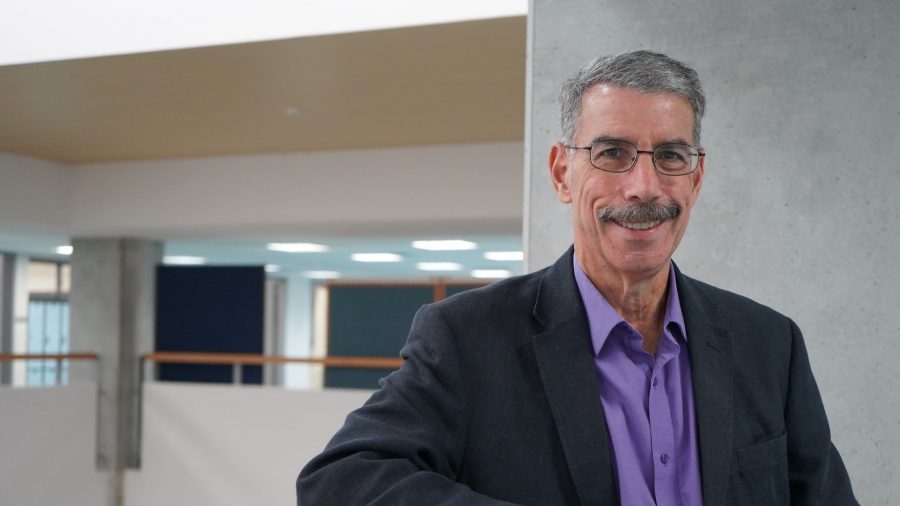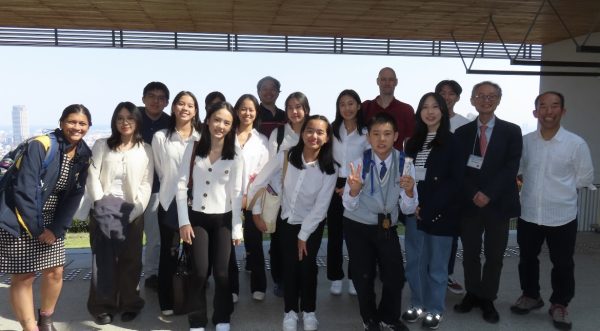A discussion with former CNN correspondent about the COVID-19 Coronavirus and its impact on journalistic reporting
A Blue & Gold reporter interviews former CNN correspondent Mr. Mike Chinoy regarding the recent COVID-19 outbreak and his perspective on responsible reporting during this pandemic.
Reporter: Politics surely play a role in how each country will perceive the COVID-19 coronavirus? What are your thoughts? Does this spark any danger?
Mr. Chinoy: There is a great danger of politics interfering with the way the world tries to address the disease. We have already seen numerous examples. These include the authorities in Wuhan suppressing initial news about the virus because they did not want it to interfere with important political meetings in January and Beijing’s effort to keep Taiwan out of the World Health Organization, and then other countries putting Taiwan in the same risk category as the mainland because the WHO has a “one-China policy” and doesn’t recognize the separateness of Taiwan. We have also seen instances of racism directed at Chinese and other Asians in numerous western countries, ranging from people being denied hotel accommodation or otherwise targeted out of the incorrect view that simply because they were Asian they might carry the virus. So handling the outbreak is going to require good government and sensible leadership- something that is in short supply in many parts of the world.
Reporter: According to the elements of newsworthiness, the COVID-19 coronavirus pandemic news can easily be placed as a top news report priority across many different news platforms. But how does the transparency of journalists reporting on this pandemic impact the community or the spread of information?
Mr. Chinoy: For journalists, the Coronavirus is a huge story, but it needs to be reported in a very careful, accurate, non-sensationalized way. One very good example of this has been the terrific work of Chris Buckley of the “New York Times”, who has been in Wuhan throughout this period. The Chinese online magazine “Caixin” has also done very good work, although unfortunately, it now seems to be facing tougher censorship. It can also be a scary story for journalists to report, especially those who are in contact with doctors or others on the front line of the disease. But the responsibility for covering this right is enormous.
Reporter: Tell me about how journalism and news reporting takes on a huge role in informing audiences about the COVID-19 coronavirus, do you think some reports may be overexaggerating or underestimating the (current) pandemic?
Mr. Chinoy: With Coronavirus, there have been instances of wild or inaccurate or sensationalized reporting that have served simply to alarm people rather than inform them. Unfortunately, the rise of social media has also meant that wild unfounded conspiracy theories have gained some traction online.
Reporter: Prior to the COVID-19 coronavirus pandemic, Severe Acute Respiratory Syndrome (SARS) was the first pandemic of the 21st century. In terms of news reporting, how does SARS better prepare and equip us for the dangers to come with the COVID-19 coronavirus? Have journalists or news consumers learned anything from the last pandemic?
Mr. Chinoy: One of the central lessons of past disease outbreaks- from the great flu epidemic of 1918-1919 to more recent outbreaks of Ebola- is the critical importance of transparency and accurate information. That is the only way to ensure people understand what is happening. It is also crucial in helping to avoid panic. For me, this outbreak brings back memories of SARS, especially because the Chinese authorities initially covered up the SARS outbreak, which played a major role in its spread.
Reporter: Since you currently reside in Hong Kong, how has it been like for you? Do you have any stories regarding the COVID-19 coronavirus you are willing to share?
Mr. Chinoy: After I returned to Hong Kong just before Chinese New Year, the situation here became quite serious. For a period, there was panic buying, which meant that it was very difficult to get face masks, hand sanitizer, and even toilet paper. One day, I had to wait five hours in line for toilet paper! But the situation has stabilized in recent days. Still, I wear a mask whenever I go out, I wash my hands all the time, and I use hand sanitizer every time I touch a door or push an elevator button. And so far, I’ve been fine!
This discussion shows how accurate reporting of the COVID-19 coronavirus pandemic is crucial in a time like this. News reporters, journalists, and consumers themselves need to be aware and recognize the content that they are being informed.
Here is an article from Cable News Network (CNN) which has displayed a responsible journalistic attitude in reporting about the COVID-19 coronavirus.
Here is another article that was written by a woman who specializes in reporting on pandemics, and has also covered the Ebola outbreak before. The article is from the Pro Public news website.


![Sofia Valadao [Erin Wu/The Blue&Gold]
Erin Wu [Annabelle Hsu/The Blue&Gold]](https://blueandgoldonline.org/wp-content/uploads/2025/05/erin-sofia-pic-600x450.png)
![Dr. Simeondis, Mr. Anderson. [Annabelle Hsu/The Blue&Gold]](https://blueandgoldonline.org/wp-content/uploads/2025/05/teachers-600x338.jpg)
![[PHOTO COURTESY OF UNCULTURED, JUNIPER AND CO.]](https://blueandgoldonline.org/wp-content/uploads/2025/05/student-businesses-600x338.png)
![Photo of the girl's varsity badminton team [PHOTO COURTESY OF TAS ATHLETICS]](https://blueandgoldonline.org/wp-content/uploads/2025/05/BadmintonTeam-04839-600x338.jpg)
![The Institute for Speech and Debate, now based all across the east coast of the US. [PHOTO COURTESY OF MR. WILLIAMS]
Mr. Morris' various ceramic artwork. [PHOTO COURTESY OF MR. MORRIS]](https://blueandgoldonline.org/wp-content/uploads/2025/05/Untitled-design-1-600x459.png)

![A collection of college flags. [PHOTO COURTESY OF AMBER HU ('27)]](https://blueandgoldonline.org/wp-content/uploads/2025/05/IMG_5029-600x289.jpeg)
![[PHOTO COURTESY OF PENGUIN RANDOM HOUSE, PENGUIN BOOKS, PENGUIN BOOKSHOP]](https://blueandgoldonline.org/wp-content/uploads/2025/05/books-600x338.png)